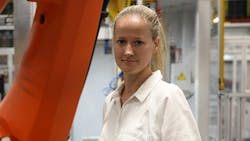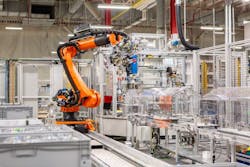‘I’m Proud to Say I’m a Nerd:’ A Valedictorian Finds Her Leadership Home at Bosch
Early in her career, Annekathrin Mueller was one of the cool kids on Bosch’s electromobility finance team when a new assignment rolled in for her. She would be headed to Feuerbach, Germany, Bosch’s oldest plant, for a junior leadership opportunity in logistics.
The plant was the opposite of cutting-edge, but Mueller liked the idea anyway. It was a new challenge and an opportunity to build her understanding of manufacturing. She would be implementing digitalization of the plant’s outdated planning and logistics system, helping workers learn new processes and gain technological expertise. And she wouldn’t be alone—the Stuttgart/Feuerbach area is also the company’s corporate hub, so there were plenty of experts around to hit up for advice.
“You would think there would be more hurdles,” said Mueller, who started at Bosch in 2002 right out of high school in its three-year international business program. “But I found more open doors because we were using digitalization in high-cost locations to make work easier.”
Finally being able to order tools electronically and gaining visibility into the progression of the lines liberated frontline managers. “We had a strong international production approach,” said Mueller. “So many of our lead plants are in Germany. It was great for [line leaders] to see, ‘My line is the same line as in the Czech Republic, and they’re doing so much better or worse. What is going on?’ Digitalization helped that collaboration.”
That was a couple of iterations ago. Mueller moved to the U.S. in 2020 to be logistics director for Bosch’s Anderson, South Carolina plant. In 2022, she became vice president and plant manager of commercial functions at Bosch’s largest plant in the U.S. in Charleston, South Carolina. The plant is undergoing a $260 million transformation, adding electrical vehicle motors and safety systems to its production, and scaling down the diesel components it has historically produced.
Mueller’s career has been one big learning curve. Here are some lessons she’s learned along the way:
Be open to new opportunities.
“My way to Bosch wasn’t manufacturing. My father was a Bosch associate. My mom and dad have been divorced forever, so he wasn’t much around. I’m an introverted bookworm, and his Bosch anniversary books were handed down to me. That’s how I got inspired. I saw that this was a wide-ranging, pretty cool company. Robert Bosch himself is an inspiration to me. And then they had an international business program.
“I’m proud to say I’m a nerd. I was the valedictorian of my high school. So the good and bad about it is if you have straight A’s, it’s very difficult to prioritize. ‘What are you really good at?’
“Then the international business program came on the table. It’s three years. They pay for it all. I like math, I loved AP chemistry. Bosch has a technology-driven portfolio; it looked cool. So I went for it. And after the studies, I started in corporate research, where the smartest minds of Bosch are. And manufacturing kicked in 10 years later.
“Manufacturing is never dull. You’re so close to the people actually contributing to the value add of the company. You’re making an impact. It’s great to hear the feedback from a bunch of hourly folks. Manufacturing has a bad connotation. But actually, when you walk through a Bosch facility, it’s clean, it’s bright. We even have a Starbucks here.”
Take the leap if it feels right—it will all work out.
“I got a phone call on Thanksgiving. ‘There’s an opportunity coming up in Charleston.’ I had always wanted to be a plant manager. The thought had crossed my mind: ‘Could I do my boss’s job?’ It’s an exciting role. I thought I could bring something to the table. Charleston is the biggest manufacturing plant that we have, and I knew that they were going through a big transformation.
“Here’s the negative. It was November. I’m like, ‘It sounds exciting. When is that about to happen?’ They said ‘January.’
“‘January, which year?’
“‘January, like tomorrow.’
“That made my heart sink. I was in the middle of transformation in Anderson. We were going from outsourcing to insourcing. It was a super busy time. We had just built a team. We had gone through the pandemic together. You go through hell and keep going. We were making good progress, and our KPIs were improving. But to leave a team when you are 80% done and 20% still lingering. That made my heart sink.
“But I went for it. Thankfully [the transition] didn’t happen as fast as they said. It happened in May 2022.”
Once you’ve moved your entire family across the ocean, it’s much easier moving them four hours North.
“I’m a mom of two. I had already crossed off going from Germany to the U.S. So I knew what we were dealing with in a way. The kids were already like, ‘Hey, let’s stay.’ They were having a good time. I knew they were happy. So that was one thing off my plate.”
Lead with intention.
"Five of my managers [in Anderson] were new, and they were kind of siloed. On top of that, we had the pandemic. The whole team having joint lunches—that was not happening anymore. It was very stressful.
"I discussed with them whether we needed to be more intentional on leadership. “Don’t we need to do extra to bring people back, to intentionally check in on people not just per agenda, but to show that we care?” They were interested.
"I started a Friday leadership class, talking about dedicated leadership. We used some of the material at Bosch around psychological trust and positivity. I just guided them, and as they grew stronger and more confident in their leadership roles, it really went from teaching to mentoring, to just watching them co-coach each other.
Let go, but come back to visit.
"I like going back from time to time to Anderson. They’re doing great. They don’t need me anymore.
Different leaders have different ways of communicating.
“I have experienced plants where there’s a lot of ‘Mommy and Daddy are not on the same page.’ Where the two plant managers are not speaking the same language. In Charleston, I was going into a situation of change. I thought, ‘How do we collaborate and how do I get a voice?’ Because I have something to bring to the table, but I want to be respectful because the other plant manager has so much more experience. So I asked him—‘Can we have a daily check-in so that we can make sure we’re speaking the same language, you with your organization, me with mine?’
“You know his answer? He said ‘No.’ I thought, ‘Oh my gosh. This is getting off to a wrong start.’
“I thought he didn’t want to align with me. Oh, wonderful. But from the first day, we have had all of our joint meetings in front of the group. So we are so aligned; we don’t need an alignment meeting. We are aligning in the meeting.
“All of my fears that we would not speak one language, that we would not drive transformation of the plan jointly because of his background being so different—it didn’t come to fruition. Of course, we think differently. But we are driving in the same direction. It is so helpful for me to learn from him, and vice versa.”
Seek out mentors, big and small.
“Throughout my career, I’ve had the opportunity of having mentors guide me through specific programs. Coming into my role in the U.S., I reached out to our senior vice president of human resources, Charlie Ackerman. ‘Charlie, this is what I’m finding right now. What would you do?’ Labor laws are different. People are different, management.
“If I ask, most of the time, I get help. You find kindness and approachability at Bosch. That is an underlying value that makes me stay. I think it was the founder, Robert Bosch, himself, who set that tone—the DNA of trust, fairness, openness. I’ve been lucky enough to find that throughout the company.
“We have leadership training for women at Bosch, which is great. The automotive industry is very male. Sometimes I do feel like I’m entering a lion’s den, and I’m the rabbit. My male mentors cannot help me. They can help me with technical situations, but a female coach is helping me on, ‘How do I make sure that I’m not feeling like a rabbit? That I am the lioness.’
“I’m thinking of a situation just this morning. I was here at 4:30, interacting on a skip level with our third-shift associates. And oh boy, some of them came in grumpy at the end of the shift, like ‘I’m going to let them know how bad it is.’
I’m thinking, ‘OK, it’s early in the morning. How do I deal with it? Because my inner nature is to be the introvert. I’m going to be in my corner. But I’m thinking of all the training I’ve had. And one of my women’s leadership coaches had said, ‘No matter what, always remember, you’re the queen of the room.’ I’m in charge of the room and I can facilitate it. Just by asking, ‘Hey what would you do?’ All of a sudden all of the [negative] energy is out of the room.
Main photo: Mueller stands underneath a Kuka robot in the Bosch Charleston plant.
About the Author

Laura Putre
Senior Editor, IndustryWeek
As senior editor, Laura Putre works with IndustryWeek's editorial contributors and reports on leadership and the automotive industry as they relate to manufacturing. She joined IndustryWeek in 2015 as a staff writer covering workforce issues.
Prior to IndustryWeek, Laura reported on the healthcare industry and covered local news. She was the editor of the Chicago Journal and a staff writer for Cleveland Scene. Her national bylines include The Guardian, Slate, Pacific-Standard and The Root.
Laura was a National Press Foundation fellow in 2022.
Got a story idea? Reach out to Laura at [email protected]


